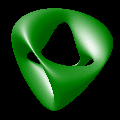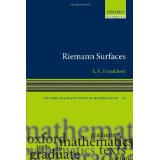 |
MAT 543 |
Prof. Claude LeBrun.
Office: Math Tower 3-108.
Office hours: TuTh 2:00--3:30, or by appointment.
 |
MAT 543 |
Prof. Claude LeBrun.
Office: Math Tower 3-108.
Office hours: TuTh 2:00--3:30, or by appointment.
This course will offer a gentle introduction to the theory of Riemann surfaces, a rich and beautiful subject located at the crossroads between various mathematical disciplines, including complex analysis, algebraic geometry, Riemannian geometry, geometric topology, and partial differential equations. While the subject has a long and venerable history rooted in the classical theory of functions of a complex variable, our approach will be a modern one, aimed at introducing the student to the tools needed to study higher-dimensional complex manifolds. Topics will include: divisors, line bundles, sheaf cohomology, Dolbeault cohomology, Serre duality, projective embeddings, conformal geometry, uniformization, and the classification of Riemann surfaces of low genus.
While the lectures will be relatively self-contained, they will certainly presuppose a broad, basic mathematical knowledge on the level of the core courses. Students who have not yet passed the departmental comprehensive exam may therefore enroll only by permission of the instructor.
 Recommended Textbook:
Recommended Textbook:
Simon Donaldson,
Riemann Surfaces,
First edition,
Oxford University Press,
2011.
Grades will be based on homework and class participation.
The Professor may be reached via e-mail by
.
This is the best method for making appointments outside normal
office hours.
Stony Brook University expects students to maintain standards of personal integrity that are in harmony with the educational goals of the institution; to observe national, state, and local laws as well as University regulations; and to respect the rights, privileges, and property of other people. Faculty must notify the Office of Judicial Affairs of any disruptive behavior that interferes with their ability to teach, compromises the safety of the learning environment, or inhibits students' ability to learn.
DSS advisory. If you have a physical, psychiatric, medical, or learning disability that may affect your ability to carry out the assigned course work, please contact the office of Disabled Student Services (DSS), Humanities Building, room 133, telephone 632-6748/TDD. DSS will review your concerns and determine what accommodations may be necessary and appropriate. All information regarding any disability will be treated as strictly confidential.
Students who might require special evacuation procedures in the event of an emergency are urged to discuss their needs with both the instructor and DSS. For important related information, click here.